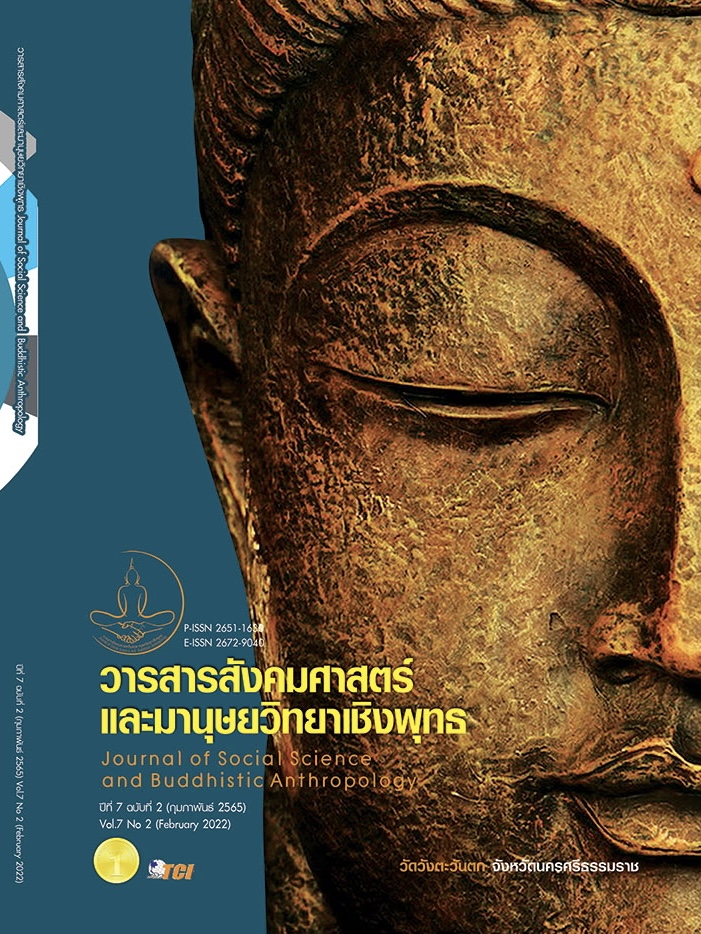THE STRATEGY MANAGEMENT OF THE STORING ELECTRICITY BILLS OF LAO ELECTRIC ENTERPRISES IN VIENTIANE CAPITAL PEOPLE’S DEMOCRATIC REPUBLICTHE STRATEGY MANAGEMENT OF THE STORING ELECTRICITY BILLS OF LAO ELECTRIC ENTERPRISES IN VIENTIANE CAPITAL PEOPLE’S DEMOCRATIC REPUBLIC
Keywords:
Strategy, Collecting Electricity Bills, Electricity EnterprisesAbstract
The objectives of the research article were to: 1) study problem condition for collecting electricity bills of Lao electricity enterprises in the Vientiane Capital Region Lao People's Democratic Republic, 2) define strategy for management collecting electricity bills of Lao electricity enterprises, and 3) assess the satisfaction of the electricity bill management strategy. This was research and development method by 3 phases, the first to study problem condition for collecting electricity bills of Lao electricity enterprises, a sample group of 278 persons who was officials involved in collecting electricity bills, the questionnaire was used with statistics on frequency, percentage, mean and standard deviation. The second, to define strategy for management collecting electricity bills of Lao electricity enterprises, the key informants were 15 qualified persons who was executive and officials involved in collecting electricity bills, and also using in-depth interviews, group discussions and content analysis, and the third, to assess the satisfaction of the electricity bill management strategy, the key informants were 30 persons of the officials involved in collecting electricity bills, for using an assessment by specific selected of the key informants with statistics of frequency, percentage, mean, standard deviation and summarize. It was found that: 1) the condition for collecting electricity bills was moderate level ( = 3.79, S.D. = 0.65) such as 1.1) planning, 1.2 organizing, 1.3 recruitment, 1.4 administer, 1.5) coordinate, 1.6) budget, and 1.7) report and evaluation 2) The strategic definable consists of vision, mission, goals and strategies including with 2.1) to develop a system for organizing workers, 2.2) develop operational planning in advance, 2.3) to develop organize system, and 3) The strategic evaluation was appropriate and possibility, average level >3.51 or higher was considered to pass the assessment criteria.
The objectives of the research article were to: 1) study problem condition for collecting electricity bills of Lao electricity enterprises in the Vientiane Capital Region Lao People's Democratic Republic, 2) define strategy for management collecting electricity bills of Lao electricity enterprises, and 3) assess the satisfaction of the electricity bill management strategy. This was research and development method by 3 phases, the first to study problem condition for collecting electricity bills of Lao electricity enterprises, a sample group of 278 persons who was officials involved in collecting electricity bills, the questionnaire was used with statistics on frequency, percentage, mean and standard deviation. The second, to define strategy for management collecting electricity bills of Lao electricity enterprises, the key informants were 15 qualified persons who was executive and officials involved in collecting electricity bills, and also using in-depth interviews, group discussions and content analysis, and the third, to assess the satisfaction of the electricity bill management strategy, the key informants were 30 persons of the officials involved in collecting electricity bills, for using an assessment by specific selected of the key informants with statistics of frequency, percentage, mean, standard deviation and summarize. It was found that: 1) the condition for collecting electricity bills was moderate level ( = 3.79, S.D. = 0.65) such as 1.1) planning, 1.2 organizing, 1.3 recruitment, 1.4 administer, 1.5) coordinate, 1.6) budget, and 1.7) report and evaluation 2) The strategic definable consists of vision, mission, goals and strategies including with 2.1) to develop a system for organizing workers, 2.2) develop operational planning in advance, 2.3) to develop organize system, and 3) The strategic evaluation was appropriate and possibility, average level
>3.51 or higher was considered to pass the assessment criteria.
References
กรมส่งเสริมการปกครองท้องถิ่น. (2564). ข้อมูลพื้นฐานของต่างประเทศ 2564. เรียกใช้เมื่อ 24 มีนาคม 2564 จาก http://www.bangkokideaeasy.com/informations /ec/index.php?op=dynamiccontent_detail&dynamiccontent_id=26198
กระทรวงพลังงานและเหมืองแร่. (2016). ยุทธศาสตร์การพัฒนาพลังงานครั้งที่ 8. สาธารณรัฐ ประชาธิปไตย ประชาชนลาว: กระทรวงพลังงานและเหมืองแร่.
คำแฝง สูนดาวเฮือง. (2562). ยุทธศาสตร์ด้านพลังงานไฟฟ้า การปรับเปลี่ยนกระบวนทัศน์ และทัศนคติของประชาชนต่อยุทธศาสตร์ ด้านพลังงานไฟฟ้า กรณีศึกษา 4 แขวงภาคใต้ ของ สปป.ลาว. วารสารมนุษยศาสตร์และสังคมศาสตร์ มหาวิทยาลัยราชภัฏสุรินทร์, 21(2), 271-290.
เจ้าหน้าที่เกี่ยวข้องการจัดเก็บเงินค่ากระแสไฟฟ้า. (19 มิถุนายน 2563). เรื่องยุทธศาสตร์การบริหารการจัดเก็บเงินค่ากระแสไฟฟ้าของรัฐวิสาหกิจไฟฟ้าลาว ในเขตพื้นที่นครหลวงเวียงจันทน์ สาธารณรัฐประชาธิปไตยประชาชนลาว. (สมศักดิ์ บุญมาตา, ผู้สัมภาษณ์)
บุญชม ศรีสะอาด. (2556). วิธีการทางสถิติสำหรับการวิจัย เล่ม 2. กรุงเทพมหานคร: สุวีริยาการพิมพ์.
เบญจพร จันตะเรือง. (2560). ยุทธศาสตร์การพัฒนาประสิทธิภาพงานจัดเก็บรายได้ ของเทศบาลตำบลหนองปล้อง เมืองวังทรายพูน จังหวัดพิจิตร. ใน
วิทยานิพนธ์ศิลปะศาสตร มหาบัณฑิต สาขาวิชายุทธศาสตร์การพัฒนา. มหาวิทยาลัยราชภัฏพิบูลสงคราม.
ภักดี มานะหิรัญเวท. (2556). การจัดการเชิงกลยุทธ์ระดับโลก. นนทบุรี: กรีนแอปเปิ้ล กราฟฟิค พริ้นติ้ง.
รัฐวิสาหกิจไฟฟ้าลาว. (2562). โครงร่างการจัดตั้งฝ่ายปฏิบัติการไฟฟ้านครหลวง. นครหลวง เวียงจันทน์: รัฐวิสาหกิจไฟฟ้าลาว.
สำนักงานความร่วมมือพัฒนาเศรษฐกิจกับประเทศเพื่อนบ้าน (องค์การมหาชน) (สพพ.). (2564). รายงานภาวะเศรษฐกิจของประเทศ สปป.ลาว. เรียกใช้เมื่อ 5 มีนาคม 2564 จาก https://www.neda.or.th//th/ news/detail?d=qQEcZatk.
สุธิดา อรรคนิมาตย์. (2557). ปัญหาการจัดเก็บรายได้ขององค์การบริหารส่วนตำบลบึง เกลือเมืองเสลภูมิ จังหวัดร้อยเอ็ด. วารสารการเมืองการปกครองกิจการสาธารณะ, 4(2), 314-328.
Cronbach, L. J. . (1990). Essentials of psychological testing . (5th ed.). New York: Harper Collins. Publishers.
Krejcie, R. V. & Morgan, D. W. (1970). Determining Sample Size for Research Activities. Educational and Psychological
Measurement, 30(3), 607-610.
Likert, R. (1967). “The Method of Constructing and Attitude Scale”. In Reading in Fishbeic, M (Ed.), Attitude Theory and Measuremen. New York: Wiley & Son.
Downloads
Published
How to Cite
Issue
Section
License
Copyright (c) 2022 Journal of Social Science and Buddhistic Anthropology

This work is licensed under a Creative Commons Attribution-NonCommercial-NoDerivatives 4.0 International License.









